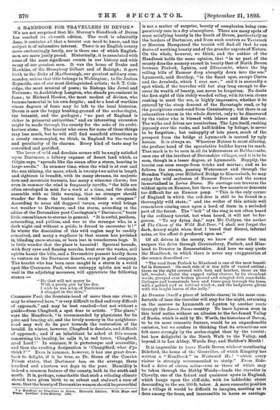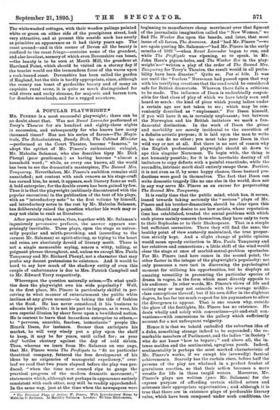A HANDBOOK FOR TRAVELLERS IN DEVON.* WE are not surprised
that Mr. Murray's Handbook of Devon has reached its eleventh edition. The work is admirably done, it contains all that a tourist can need to know, and the subject is of exhaustive interest. There is no English county more enchantingly lovely, nor is there one of which English- men are more justly proud. Historically, it is associated with some of the most significant events in our history and with many of our greatest men. It was the home of Drake and Hawkins, of Sir Humphrey Gilbert and of Raleigh ; it gave birth to the Duke of Marlborough, our greatest military com- mander, unless that title belongs to Wellington; to Sir Joshua Reynolds, one of our most distinguished artists; to S. T. Cole- ridge, the most musical of poets; to Bishops like Jewel and Patteson; to Archbishop Langton, who stands pre-eminent in fame ; to Richard Hooker, the most modest of divines, who became immortal in his own despite ; and to a host of worthies whose degrees of fame may be left to the local historian. Devon is now the happy hunting-ground of the archmologist, the botanist, and the geologist ; "no part of England is richer in primmval antiquities," and an interesting excursion might be made through the county for the sake of its archi- tecture alone. The tourist who cares for none of these things may lose much, but he will still find manifold attractions in a county unexampled, we think, in England for the variety and peculiarity of its charms. Every kind of taste may be consulted and gratified.
The lover of wild and desolate scenes will be amply satisfied upon Dartmoor, a billowy expanse of desert land which, as Gilpin says, "spreads like the ocean after a storm, heaving in large swells." In summer time, when the wind is at rest and the sun shining, the moor, which is twenty-two miles in length and eighteen in breadth, with its many streams, its majestic tors and mountain torrents, has many a winsome charm; but even hi summer the wind is frequently terrific, "the hills are often enveloped in mist for a week at a time, and the clouds assemble with so little warning, that no stranger should wander -far from the beaten track without a compass." According to some old doggerel verses, every wind brings wet weather to Dartmoor, and the storm, according to the editor of the Devonshire poet Carrington's "Dartmoor," bears little resemblance to storms in general. "It is awful, perilous, astounding, and pitiless, and woe to the stranger who, in a dark night and without a guide, is forced to encounter it !"
In winter the desolation of this wild region may be readily conceived, and many a wayfarer in that season has perished in blinding snow-storms, or been lost in treacherous bogs. It is little wonder that the place is haunted ! Spectral hounds, with fiery eyes and flaming mouths, hunt over the wastes, evil spirits haunt the hills, and a Devonshire peasant hardly dares to venture on the Dartmoor deserts, except in good company.
The tourist who has been once caught in a storm in a weird spot like Cranmere Pool, where unhappy spirits are said to wail in the adjoining morasses, will appreciate the following stanza :—
"He that will not merry be With a pretty girl by the fire, I wish he was a-top of Dartemoor A stugged in the mire."
Cranmore Pool, the fountain-head of more than one river, it
may be observed here, "is very difficult to find and very difficult of approach," and may be best reached—but not without a
guide—from Chagford, a spot dear to artists. " The place," says the Handbook, "is recommended by physicians for its pure and bracing air, and the lovely scenery in the neighbour- hood may well do its part towards the restoration of the invalid. In winter, however, Chagford is desolate, and difficult of approach ; and if an inhabitant be asked at this season
concerning his locality, he calls it, in sad tones, ' Chagford, good Lord ! ' In summer, it is picturesque and accessible; and then the exulting designation is Chaggiford, what d'ye think P ' " Even in summer, however, it has one great draw- back to delight, if it be true, as Dr. Stone of the Convict Prison states, that Dartmoor has, on the average, three
hundred and nineteen wet days in the year. Humidity is
indeed a common feature of the county, both in the south and north. It is, perhaps, remarkable that such a relaxing climate should have given birth to so robust and stalwart a race of men; that the beauty of Devonshire women should be proverbial • 4 Handbook for Travellers in Devon. Eleventh Edition. With Maps and Plaza. London ; John Murray. 1555.
is not a matter of surprise, beauty of complexion being coin.. paratively rare in a dry atmosphere. There are many spots of most satisfying beauty in the South of Devon, particularly on
the borders of Dartmoor, and from such centres as Tavistock or Moreton Hampstead the tourist will find all that he can
desire of soothing beauty and of the grander aspects of Nature. On the whole, however, we think, and the author of the Handbook holds the same opinion, that "in no part of the county does the scenery exceed in beauty that of North Devon between Porlock, Lynton, and Ilfracombe, where the big rolling hills of Exmoor drop abruptly down into the sea."
Lynmouth, said Southey, "is the finest spot, except Cintra and the Arralaeda, which I ever saw ; " and it is assuredly a spot which, if the traveller will but stay long enough to dis- cover its wealth of beauty, can never be forgotten. No doubt the first sight of this richly wooded valley, with its twin rivers rushing to meet the sea, is highly impressive, whether it be entered by the steep descent of the Barnstaple road, or by the precipitous coast-road from Countesbury ; but there is an exhaustless charm in the whole district, only to be discovered by the visitor who is blessed with leisure and fine weather.
The walks and drives are numberless. The Lyn itself, rushing joyously over the rocks, and half-hidden by foliage, is never to be forgotten ; but unhappily of late years, much of the prospect from the bridge at Lynmouth is marred by ugly houses. It is always so. Wherever Nature is most alluring, the profane hand of the speculative builder leaves its mark. That mark is to be seen in all its hideousness at Babbacombe,
once one of the loveliest of Devonshire villages, and it is to be seen, though in a lesser degree, at Lynmouth. Happily, the tourist can soon escape from bricks and mortar ; and as he follows the stream, passing Watersmeet and through the Brendon Valley, over Hillsford Bridge to Si monsbath, he may enjoy the wild seclusion of Exmoor Forest and the scenes immortalised in Lorna Doane. No carriage can traverse the wildest spots on Exmoor, but there are few ascents or descents too difficult for an Exmoor pony. "This is the only corner of England in which the red-deer is still to be found in a
thoroughly wild state ; " and the writer of this article well
remembers cciming once upon a herd of them in a secluded part of the forest. The " bell " of the stag is not often heard by the ordinary tourist, bat when heard, it will not be for- gotten. "To my dying day," says Mr. Collyns, the author of The Chase of the Wild Red-Deer, "I shall not forget the dark, dreary night when first I heard that dismal, infernal
noise, or the effect it produced upon me."
Of all drives in the county, we know of none that can surpass the drive through Countesbury, Porlock, and Mine-
head to D mister in Somersetshire. And here we may quote the Handbook, in which there is never any exaggeration of
the scenes described :—
" The road from Porlock to ltlinehead is one of the most beauti- ful in Somerset. On each side of it rise hills of varied outline ; those on the right covered with fern and heather, those on the left, wooded ; whilst the rugged valley charms by its abundant woods, grouped over broken ground hnd mingled with corn-fields. Cottages and homesteads hero and there peep through the trees, with a gabled roof or latticed window, and the hedgerows glitter with the blight leaves of the holly."
At Danster (itself a place of infinite charm) in the most com- fortable of inns the traveller will stay for the night, returning on the morrow to Lynmouth or Lynton by another route through the Lorna Doone country. To leave Lynton even in this brief notice without an allusion to the far-famed Valley of Rocks, which is said by Mr. Worth, the historian of Devon, to be its most romantic feature, would be an unpardonable omission, but we confess to thinking that its attractions are felt more strongly by the archmalogist than by the tourist; but how delightful is the North Walk to the Valley, and beyond it to Lee Abbey, Wooda Bay, and Heddon's Mouth !
It is impossible to leave North Devon without mentioning Bideford, the home of the Grenvilies, of which Kingsley has written a " Handbook " in Westward Ho ! "which every visitor is strongly recommended to study." From Bide- ford a drive of eleven miles—two or three of which may be taken through the Hobby Woods—lands the traveller in Clovelly, one of the fairest and quaintest spots in England, which hangs upon the cliff-side, with its ladderlike street descending to the sea 500 ft. below. A more romantic position for a village it would be difficult to imagine, nestling as it does among the trees, and inaccessible to horse or carriage.
The whitewashed cottages, with their wooden palings painted white or green on either side of the precipitous street, look very attractive, and at present this seaside nook has nearly as primitive an appearance as it had thirty years ago. The coast around—and in this corner of Devon all the beauty is confined to the coast fringe—contains some of the grandest, and also loveliest, scenery of which even Devonshire can boast, —the beauty is to be seen at Mouth Mill, the grandeur at Hartland Point, which should be visited on a stormy day if the tourist would see the tremendous force of the waves upon a rock-bound coast. Devonshire has been called the garden of England, but the title is hardly appropriate, since, although the county can boast of gardenlike beauty and of many an exquisite rural scene, it is quite as much distinguished for wild rivers and rocky streams, for majestic and barren tors, for desolate moorlands, and for a rugged sea-shore.



































 Previous page
Previous page